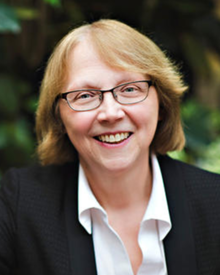
Where the rubber meets the road
Bringing together foundational science and effective implementation to tackle big problems

Bringing together foundational science and effective implementation to tackle big problems
By Sam Toman Faculty of EnvironmentNearly every Canadian has found themselves in a situation where they must get behind the wheel of a car during terrible weather conditions. It could be a rushed trip to the airport, a commute to work, or an early morning hockey practice. It can be scary. How quickly and effectively roads get cleared makes a big difference for our sanity and economy — it also saves lives.
Jean Andrey, dean of Waterloo’s Faculty of Environment, has dedicated her decades of scholarship to give governments across Canada what they need to keep our roads safe. With our climate becoming more unpredictable, that’s even more important. Even the most hardened commuter knows the number of days drivers battle extreme weather continues to rise.

“In some ways the physical science of my research is pretty straight-forward,” says Andrey, who grew-up on a farm in blizzard-prone Bruce County, Ontario. “Varying degrees of water, snow, highway or road pavement-type, wind conditions, vehicle speeds, etcetera, all produce information useful in determining the levels of road safety.”
Over the years Andrey has analysed innumerable data to ascertain exactly when, where and how governments can respond to dangerous road weather. But that’s only half the story.
“The challenge isn’t always what will keep roads safe, but how to make it happen given realities like budgets, driver behaviour and human geography,” says Andrey. “Reconciling those two problems, the physical science and the social science is what the Faculty of Environment does. The same for climate change, we know what’s happening, we know the risk, but how do make those solutions real?”
Andrey has served as dean of the Faculty of Environment since 2014 and has been a member of the faculty since 1989. Prior to her appointment as interim dean, Andrey served for six years as the associate dean, graduate studies for the faculty, and four years as the associate chair, graduate studies for the department of Geography and Environmental Management. She’s also an alumnus.
This approach to tackling environmental problems — foundational science meets effective implementation — transfers to more than just climate research. In August of this year, Andrey led a partnership between researchers across faculties at Waterloo and the Region of Waterloo to update its official plan in light of COVID-19.
“That partnership is a perfect example of my approach to how we can manage threats, work together, trust in science and get it done frankly,” says Andrey.
The partnership led to 13 papers from top researchers ranging from Jeff Casello’s Reassessing Public Transportation in a Post-Pandemic World, to Leia Minaker’s Resilient Food Systems in the Region of Waterloo to First Nation-Municipal Relationships: Best Practices and Emerging Challenges in the Context of COVID-19 by Janice Barry and Katie Turriff.
“This kind of collaboration between academics, faculties, government and industry is how we take on something like COVID-19,” says Andrey. “But It’s also a lesson for how we can manage other threats we face.”
For example, ensuring everyone has affordable housing to shelter in place can slow the spread of COVID-19. At the same time this protects racialized communities hardest hit by the pandemic, allowing us to live closer to work, while also using less fossil fuels and reducing commuting times in the kind of dangerous weather Andrey researches.
“I know people can feel overwhelmed at times by everything going on. Leading this faculty has given me hope because sustainability issues are so interconnected, making positive change in one area can trigger positive change in another. We all have a part to play if we listen to each other and work together.”
To hear more from Jean Andrey, register for the University’s next Waterloo Innovation Summit scheduled for November 30, where industry leaders will explore how green innovation and sustainable enterprises can drive economic growth while ensuring our planet’s future.

(GettyImages/ Rosella De Berti)
Read more
Study reveals changes International Olympic and Paralympic Committees could implement to keep Games viable and safer for athletes

Read more
An ambitious research collaboration with Habitat for Humanity is reimagining home ownership across Waterloo Region and Canada

Read more
Here are the people and events behind some of this year’s most compelling Waterloo stories
The University of Waterloo acknowledges that much of our work takes place on the traditional territory of the Neutral, Anishinaabeg, and Haudenosaunee peoples. Our main campus is situated on the Haldimand Tract, the land granted to the Six Nations that includes six miles on each side of the Grand River. Our active work toward reconciliation takes place across our campuses through research, learning, teaching, and community building, and is co-ordinated within the Office of Indigenous Relations.